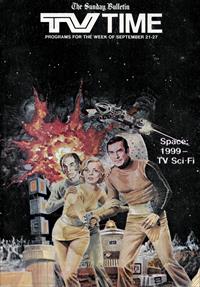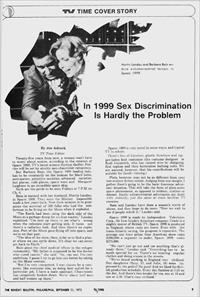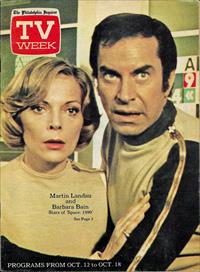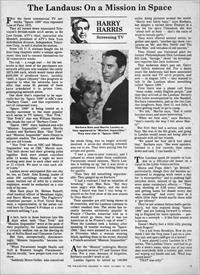Press
Philadelphia newspapers
In the mid-1970s, the city of Philadelphia in Pennsylvania had two dominant newspapers, the morning Philadelphia Inquirer and the evening Philadelphia Bulletin. The Bulletin was starting to decline around this time, and would close in 1982. Space: 1999 was shown on Philadelphia channel 6, WPVI-TV, an ABC affiliate.


The Sunday Bulletin, TV Time p9, 21 September, 1975
By Joe Adcock, TV Time editor
Twenty-five years from now, a woman won't have to worry about sexism, according to the creators of Space: 1999, TV's latest science fiction thriller. Policies will be set by strictly non-chauvinist computers. But Barbara Bain, the Space: 1999 leading lady, has to be constantly on the lookout for black holes, anti-matter, primitive societies, advanced societies, hot places, cold places, space wars and Margaret Leighton in an incredible space ship.
Such are the perils to be seen Fridays at 7 P.M. on Ch. 6.
Bain is teamed with her husband, Martin Landau, in Space: 1999. They were the Mission Impossible leads a few years back. Now their mission is to guarantee the survival of 300 folks who had the mis- fortune to be living on the Moon when it exploded.
"The Earth had been using the dark side of the Moon as a garbage dump for nuclear wastes," Landau explained. "I'm sent up there to see what's wrong when the colonists start getting sick. It turns out there's a radiation leak. And then there's an explosion. Part of the Moon goes flying off into space, and we're on that part.
"The idea of the show, then, is for us to find a planet where we can settle down. It's clear we can never get back to Earth."
Bain plays the chief medical officer in the refugee community. "My father is supposed to be the doctor who cured cancer," she said. "So, you see, I'm very ambitious. I guess I try to go him one better by taking on the Moon venture.
"But I'm very competent. I was chosen by a computer, like everyone else, as being best suited for a particular job. I have a male assistant. Chauvinism has completely broken down. We're about half men and half women up there."
Space: 1999 is very novel in some ways, and typical TV in others.
There's lots of futuristic plastic furniture and zipper-laden knit costumes (the costume designer is Rudi Gernreich, who has caused stirs by designing first topless and then bottomless bathing suits. We are assured, however, that his contributions will be suitable for family viewing.)
Plots, however, may not be so different from your non-science fiction serials. Judging from one sample, I gather there's going to be the basic fearsome adversary situation. This will take the form of alien outer space phenomena, as opposed to robbers, rustlers or disease. Exotic extraterrestrial adversaries are dealt with violently, just the same as more familiar TV enemies.
Bain and Landau have done a season's worth of shows, and they hope to do more. "Now we wait to see if people watch it," Landau said.
Space: 1999 is made by Independent Television Corp., Sir Lew Grade's American company. Grade is a mighty mover of British TV. Space: 1999 is produced in England, where costs are lower. Even with the trans-Atlantic saving, the program is expensive. The average one hour prime time American show costs $200,000 a segment to make. Space: 1999 costs $275,000.
"We can't just go out and use anything that's already there," Landau said. "Everything has to be made special for us. There's no wearing regular clothes and doing scenes in the streets.
"We've found working in England very civilized. Our daughters (Suzy, 15, and Julie, 10) were impressed by the police! No guns! And we liked the British production schedule. Every day finishes at 5.20 on the dot. And there's two breaks for tea, one at 10 and one at 3.30. That's very civilized."


by Harry Harris, Screening TV
Philadelphia Inquirer, TV Week p3, 12 October 1975
For the three commercial TV networks, Space: 1999 may represent Loss of Face: 1975.
They all turned down Associated Television's British-made sci-fi series, so Sir Lew Grade, ATV's chief, instructed Abe Mandell, president of ATV's New York distribution division, Independent Television Corp., to sell it station-by-station.
Some 155 U. S. stations bought the 24 hour-long chapters under a unique agreement: they had to commit themselves for 52 consecutive weeks.
The rub - a rough one! - for the networks is that most of the purchasers are network affiliates who consider the costly ($275,000 each, which would mean about $400,000 if produced here), lavishly 2001: A Space Odyssey-like program so superior to what the networks have to offer that some 65 percent of them have scheduled it in prime time, preempting network series.
One show that's expected to be especially hurt by Space: 1999 is ABC's new Barbary Coast, and that represents a sort of compound irony.
Space: 1999 is being touted as a worthy successor to the most popular sci-fi series in TV history, Star Trek. Star Trek's star was William Shatner, who heads the cast of Barbary Coast.
Space: 1999 stars husband-and-wife Mission: Impossible" alumni Martin Landau and Barbara Bain. "Star Trek" and "Mission: Impossible" were filmed in adjacent studios. The Landaus and Shatner are old friends.
Star Trek was on NBC and Mission: Impossible was on CBS," Martin says, "but both shows had their growing pains together. Both were almost cancelled after 13 weeks. Many a night we were working next door to each other until 10 or 11 o'clock. We used to visit each other's sets."
Landau never anticipated that one day he, too, as Cmdr. John Koenig, leader of some 300 earthlings stranded on the moon, hurtled out of orbit by a nuclear explosion, would be embarked on a star trek of his own.
Miss Bain plays Dr. Helena Russell, chief medical officer of Moonbase Alpha, and Barry Morse, once The Fugitive's relentless pursuer, is Prof. Victor Bergman, a superscientist, in the series carried here by Channel 6 Fridays at a non- network-nettling 7 p.m.
In fact, back in those halcyon late-'60s days when both Star Trek and Mission: Impossible were at the peak of their popularity, the Landaus envisioned a virtually endless run as the derring-do duo of Rollin Hand and Cinnamon Carter. But then, unexpectedly, disconcertingly, Mission: Impossible became impossible.
"When Paramount bought Desilu and Gulf and Western bought Paramount," Martin recalls, "new people took over the show.
"Suddenly Bruce Geller, who conceived the whole thing, was no longer actively involved. A seven-day shooting schedule was cut to six. They were paying less for scripts and guests.
"I had a year-to-year contract, and I refused to return under those conditions. Paramount issued releases, 'Marty Landau is holding us. up,' but it was never a question of money. I was holding them up for quality.
"Then they did something unpardonable. They ganged up on Barbara."
"I had a contract I had no intention of breaking," says Miss Bain. "But they were angry with Marty, and the next thing I heard was that I was being replaced on the first show of the new season by Dina Merrill."
Their episodes are still being shown in 69 countries, and the Landaus continue to collect residual fees. The series has recently become extremely popular in France ("Charles Aznavour told us it would never go there, that it was too American to be France's cup of wine!"). When the Landaus took a holiday after spending 16 months working on "Space: 1999," they were amused in a small town in Provence when a woman wearing black, spotting them in the street, shouted a French-accented Mission: Impossible!
After the Mission imbroglio, Martin played several TV and feature film roles. For a year, because of litigation, Barbara couldn't work at all.
Landau figures he totted up 100,000 miles, doing pictures around the world. "Marty was fairly busy," says Barbara, but despite a record three Emmys in a row for her spicy Cinnamon, she was "about half as busy - that's the ratio of male to female parts."
They were offered several series, together and apart, "another spy show, variations on Mr. and Mrs. North and The Thin Man, and remakes of old movies.
They filmed one Universal pilot for former Philadelphians Dick Levinson and Bill Link, Savage, about "an investigative reporter like Jack Anderson." [The article doesn't mention the director, a then-unknown called Steven Speilberg]
That Anderson didn't pan out. Gerry and Sylvia Anderson did. For a dozen years the Andersons had been associated with movie and TV sci-fi projects, and now - in August, 1973 - they wanted to talk to the Landaus about something called "Space: 1999."
First there was a phone call from "these veddy, veddy English people," and then they arrived at the Landaus' Beverly Hills home accompanied by Abe Mandell, Barbara remembers, just as the two Landau daughters, Suzy, then 13, and Julie, 8, were getting ready to go to camp.
"We felt," Martin says, "that it could become more and more interesting."
"When we first met," says Barbara, "that's exactly the way I felt about Marty!"
But first they had a serious talk with Suzy. She was in the 8th grade, and going to London would mean not being able to graduate with all her friends.
<"We asked her how she'd feel about that," Barbara says. "She went upstairs, listened to a few records, then came down and said, 'I can handle it.' "/p>
The Landaus spent 20 months in London in a 200-year-old house on a canal in the Little Venice section. Mama and Papa didn't "go British," particularly; though they did become accustomed to stopping work twice a day for "a nice cup of tay" and to pushing light switches down, instead of up, but there were some vocabulary effects - "They stop shooting at 5:20 every afternoon, and getting home for dinner every day was smashing!" And every once in a while little Julie would startle them with a "gor blimey!"
They're not science fiction buffs particularly, but they enjoyed doing Space: 1999 and are looking forward to returning to England for more episodes - perhaps on a network - if this first season is a success.
Doesn't Marty feel a little silly playing Buck Rogers?
"I'm a kid from Brooklyn. How do you think I felt the first time I put on a cowboy suit and spurs and-got on a horse?
"I once played Lucky Luciano in a TV series, The Lawless Years, and had to go into a men's room while one of my men shot everybody with a tommy gun, come out wiping my hands and ask, 'What happened here?'
"THAT was silly!"